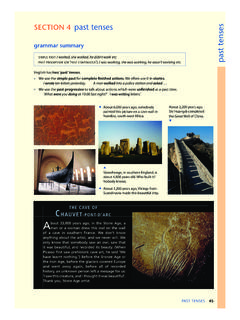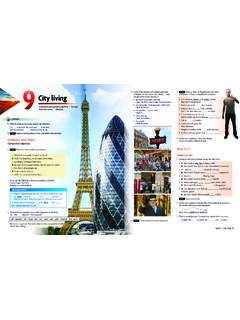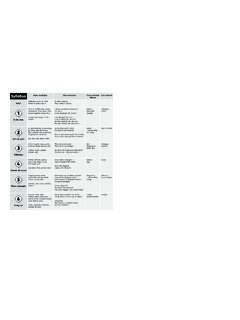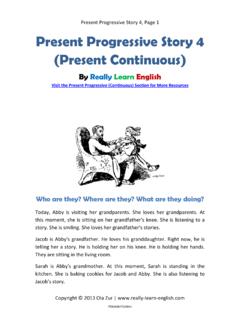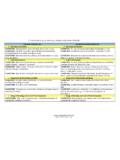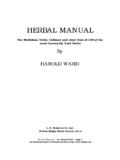Transcription of is sitting notices - Oxford University Press España
1 In some answers, both contracted forms (for example I m, don t) and full forms (for example I am, do not) are possible. Normally both are tensesLevel 219 4 Look at the pictures and write the instructions for boiling an put water in a saucepan. Then you 5 Write the instructions for cooking something else. We often tell stories and jokes with present tenses in an informal use the simple present for events things that happen one after use the present progressive for background things that are already happening when the story starts, or that continue through part of the s this Scotsman, you see, and he s walking through the jungle when he meets a gorilla.
2 And the gorilla s eating a snake sandwich. So the Scotsman goes up to the gorilla and says .. 6 Number the parts of the story in order and put in the correct forms of the close go hold keep notice open say sit throw work But there are no elephants in these mountains, the woman. Suddenly the man the window, out the orange and the window again. Because we through the mountains. Oranges the elephants away. 1 A woman is sitting in a railway carriage when she notices that the man opposite her an orange in his hand and looking out of the window.
3 You see? says the man. It . Excuse me, the woman , but why did you do that? 7 you probably know a better story than this. Write it. 1914/10/2010 13:0713present tensesIn some answers, both contracted forms (for example I m, don t) and full forms (for example I am, do not) are possible. Normally both are tensessection 2 present tensesgrammar summarySIMPLE present : I work, she works, he doesn t work etc present PROGRESSIVE: I am working, she is working, he isn t working etcEnglish has two present tenses.
4 We use the simple present mostly to talk about things that are always true, and things that happen repeatedly. Dogs eat meat. My aunt lives in Leeds. I don t work on Saturdays. We can use the simple present in commentaries, instructions, stories and jokes, to describe events that happen one after another. Smith passes to Peters, Peters passes to Ollis, Ollis shoots and it s a goal! First you break three eggs into a bowl. You add butter, salt and pepper. Then you take a fork.
5 This man goes into a pub, and he says to the barman .. We use the present progressive (or present continuous ) to talk about things that are happening just around the time when we speak. Look! The dog s eating your shoe. I m working hard these days. We use the present progressive to talk about changes that are happening. Prices are going up. Transport is getting worse. We can also use the present progressive to talk about the future (see pages 27, 30). I m seeing Lucy tensesWhy computers are like women:Nobody understands the language that they use when they talk to other computers.
6 They never tell you what is wrong; and if you don t know, you re in remember your smallest mistakes for computers are like men:They know a lot of things but they are very you get one for yourself, you soon see a better like to go fast but they always wordsI hate youI love youyou get on my nervesyou re destroying medarlingdon t leave meit s your faultyou alwaysyou neverdarlingyou never listen to medon t listen to meit s just words. 1314/10/2010 13:07present tenses14 ReviseReviserevise the basics: which present tense?
7 SIMPLE present present PROGRESSIvE + I/you/we/they work he/she/it works I am, you are etc working ? do I/you/we/they work? am I, are you etc working? does he/she/it work? - I/you/we/they do not work I am not, you are not etc working he/she/it does not work things that are always true things that are happening now things that happen all the time, things that are happening around now repeatedly, often, sometimes, never etc.
8 You live in North London, don t you? My sister s living with me just now. No thanks. I don t smoke. Look Ann s smoking a cigar. Chetford Castle stands on a high hill. Why is that girl standing on the table? Alice works for an insurance company. Phil s not working at the moment. What do frogs eat? Hurry up! We re waiting for you. I play tennis every Wednesday. What are you doing? I m writing letters. The sun rises in the east.
9 Why are you crying? What s wrong? 1 DO IT yOURSELf Study the above examples. Which of these words and expressions go best with the simple present (SP), and which go best with the present progressive (PP)? permanent SP 4 always 1 temporary 5 usually 2 habit 6 just at this moment 3 just around now 7 these days but not for very long 2 GRAMMAR AND vOCABULARy: things to read Look at the pictures and numbers, and write sentences with often and now.
10 Use a dictionary if necessary. (2, 1) She often reads newspapers, but now she s reading a short story. (3,4) She often reads magazines, but now she s reading a (5,9) He 2 (8,10) She 3 (1,7) He 4 (4,2) I 5 (2,6) They 6 (3,5) He 1 short stories6 notice2 newspaper7 cookery book3 magazine8 comic4 biography9 autobiography5 poems10 1414/10/2010 13:07present tensesIn some answers, both contracted forms (for example I m, don t) and full forms (for example I am, do not) are possible. Normally both are 3 Here are some exchanges from an interview between an American journalist and a french film star.
